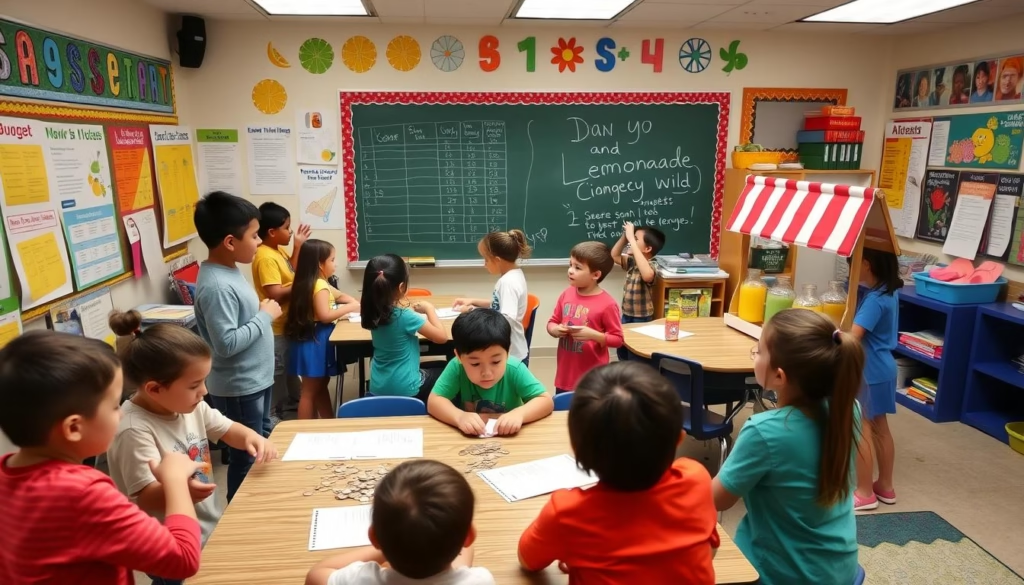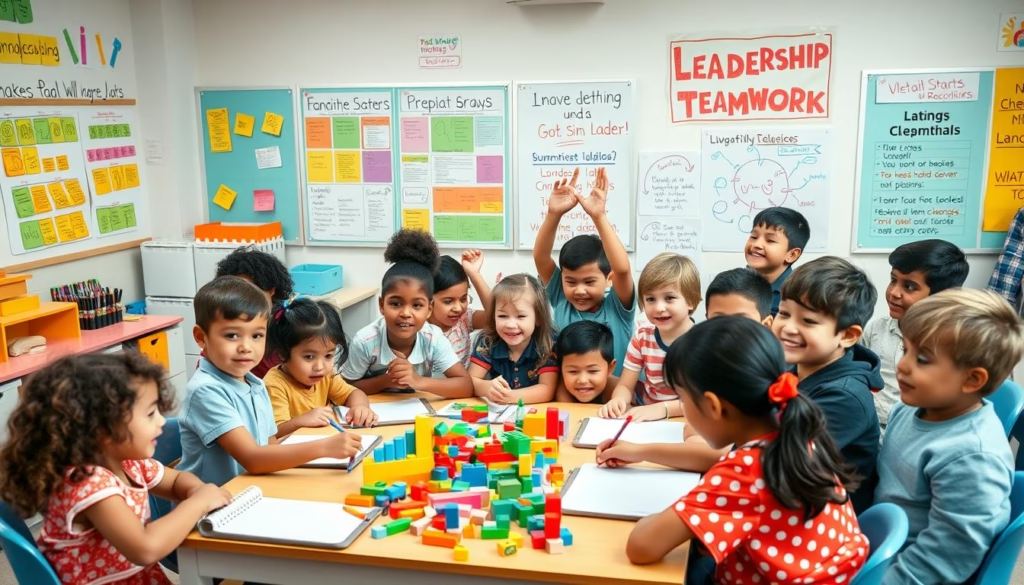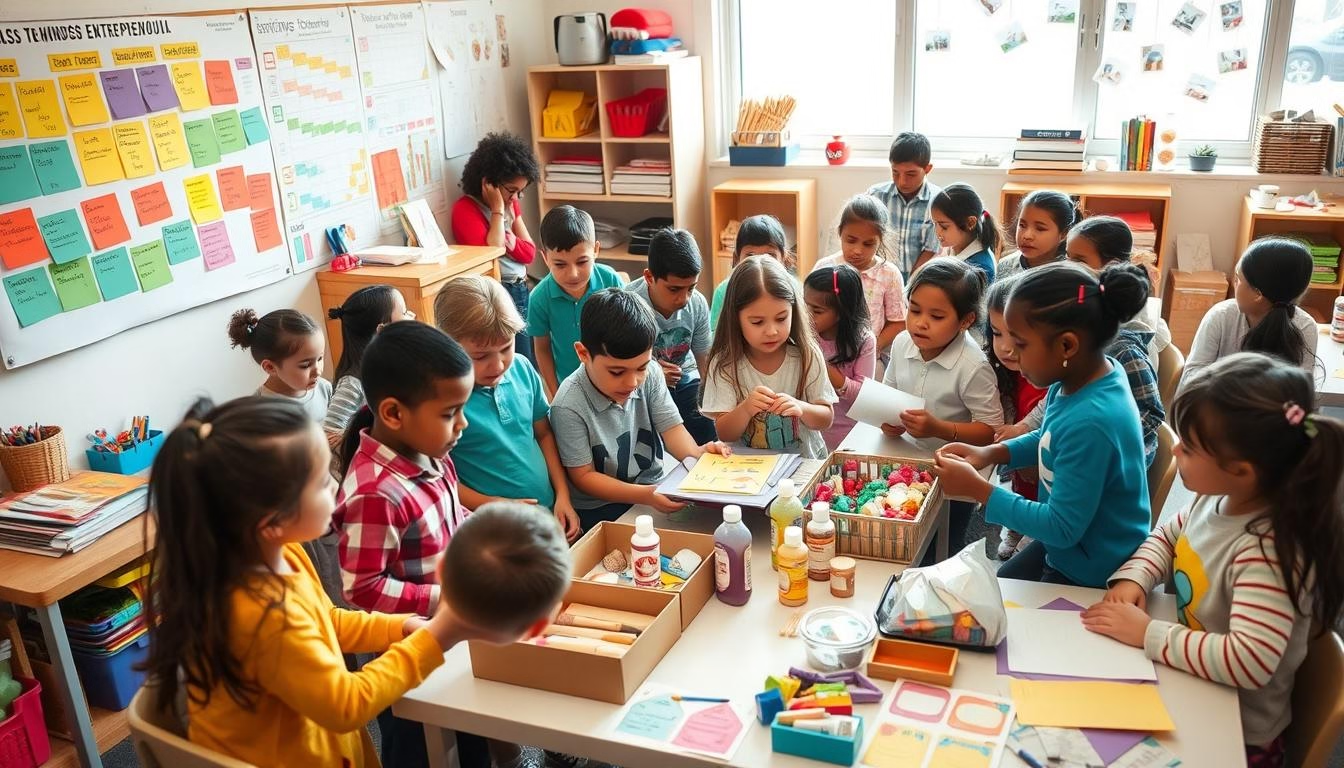Entrepreneurship education is vital for kids’ long-term success. It teaches problem-solving, creativity, and resilience. These skills are valuable in any career path.
Parents can support their children’s entrepreneurial spirit in various ways. Encouraging small ventures like lemonade stands or YouTube channels is a great start. This builds confidence and practical skills.
Research shows that fostering an entrepreneurial mindset benefits children. It helps them succeed, no matter what career they choose later in life.
Key Takeaways
- Entrepreneurship education fosters problem-solving, creativity, and resilience in children.
- Supporting early business ventures helps build confidence and valuable life skills.
- Nurturing entrepreneurial mindset benefits kids, regardless of their future careers.
- Budgeting, marketing, and inventory management are essential business skills to teach.
- Personalized customer interactions and learning from failures build valuable life skills.
Understanding the Importance of Early Entrepreneurial Education
The modern business world has changed drastically in recent decades. It now requires a diverse set of skills from the next generation. Richard Branson’s success highlights the value of complex problem-solving abilities in entrepreneurs.
Benefits of Teaching Business Skills at a Young Age
Teaching kids entrepreneurial skills offers many advantages. It helps develop critical thinking, time management, resilience, teamwork, and creativity. These abilities are highly prized in today’s job market.
Work-life balance and adaptability are crucial for success in modern careers. Early business education can help children develop these important traits.
The Nature vs. Nurture Debate in Entrepreneurship
The nature vs. nurture debate in entrepreneurship is ongoing. Some people may have innate entrepreneurial tendencies. However, research shows that encouraging these skills can benefit all children.
Impact on Future Career Success
Entrepreneurial education can greatly affect children’s future careers. It teaches problem-solving, financial literacy, and risk management skills. These abilities help young entrepreneurs-in-training navigate the changing job market.
This education benefits individuals and contributes to economic growth and innovation. It prepares children to seize new opportunities in their future careers.
“Entrepreneurship is the engine of economic growth, and early entrepreneurial education is the fuel that powers it.” – Sir Richard Branson
Transform Your Child into a Confident Kidpreneur in 28 Days – Start Today!
The Ultimate Guide to Teaching Kids Life-Changing Entrepreneurial Skills
Developing young business leaders starts with teaching entrepreneurial skills. This guide explores key competencies for kids in the future business world. It offers practical strategies for parents and educators to nurture these vital skills.
Entrepreneurship goes beyond starting a business. It’s a mindset that boosts creativity and critical thinking. Introducing these concepts early prepares children for success in various fields.
Opportunity Recognition and Problem-Solving
Kids can learn to spot market needs and create solutions. Hands-on activities help children think creatively and analyze consumer trends. They can develop unique products or services to meet unmet demands.
Financial Literacy Fundamentals
Strong financial management is crucial for young entrepreneurs. This guide shares age-appropriate ways to teach kids about money. Learning budgeting, saving, and investing early empowers kids to make smart financial choices.
Fostering Resilience and Innovation
Entrepreneurship comes with challenges. Kids need to learn how to bounce back from setbacks. This guide explores ways to help children develop a growth mindset.
It shows how to embrace failure as a learning opportunity. By building resilience and innovative thinking, kids can thrive in changing business landscapes.
Leadership and Collaboration
Young entrepreneurs need strong leadership and teamwork skills. This guide offers strategies to boost kids’ confidence and communication. These skills help in both small business ventures and team projects.
The ultimate guide to teaching kids life-changing entrepreneurial skills is a key resource. It helps parents and educators empower future business leaders. These skills open a world of possibilities for children to shape the future.
Transform Your Child into a Confident Kidpreneur in 28 Days – Start Today!“Entrepreneurship is not just about starting a business – it’s a mindset that fosters creativity, critical thinking, and the ability to thrive in an ever-changing world.”
| Entrepreneurial Skill | Benefit to Kids |
|---|---|
| Opportunity Recognition | Ability to identify unmet market needs and develop unique solutions |
| Problem-Solving | Critical thinking and creativity to overcome challenges |
| Financial Literacy | Sound money management skills for long-term success |
| Resilience | Embracing failure as a learning opportunity and developing a growth mindset |
| Leadership | Confidence, communication, and collaboration skills for effective team management |
Developing Problem-Solving and Opportunity Recognition
Entrepreneurship centers on solving real-world problems. Kids can learn to recognize opportunities by finding solutions to everyday challenges. Creative thinking and analytical skills empower young minds to become innovative problem-solvers.
Teaching Kids to Identify Market Needs
Ask kids thought-provoking questions about their surroundings. For example, “How can we make vegetables more appealing to children?” These hands-on entrepreneurship lessons for kids help develop an entrepreneurial mindset.
Encourage them to uncover untapped market needs. Ask, “What problems do our family members face?” This helps kids think about new products or services.
Fostering Creative Solution-Finding
- Encourage brainstorming and idea generation through open-ended activities.
- Provide materials for prototyping and testing potential solutions.
- Celebrate unique and unconventional ideas, even if they don’t succeed immediately.
Let children experiment and learn from mistakes. This nurtures their creative problem-solving abilities. It also teaches them to think outside the box.
Building Analytical Thinking Skills
Guide kids through a structured problem-solving process, like the scientific method. Teach them to gather information, form hypotheses, and test ideas. This analytical thinking approach helps kids make informed decisions.
“65% of children entering primary school today will ultimately end up working in completely new job types that don’t yet exist.” – World Economic Forum, January 2016
Problem-solving skills prepare children for the future workforce. Adaptability and creativity will be highly valued. These entrepreneurial abilities empower the next generation of innovative thinkers.
Financial Literacy Fundamentals for Young Entrepreneurs
Successful businesses need more than just great ideas. They require a solid grasp of personal finance. Young entrepreneurs can gain a significant edge by learning financial skills early on.
Programs like EVERFI offer lessons on crucial money topics. These include budgeting, saving, understanding credit, and managing debt. Khan Academy and Coursera provide free personal finance courses to boost financial knowledge.
Poor financial literacy can lead to debt and bad money choices. It may also require help managing finances, affecting quality of life. Ongoing education is vital as circumstances change.
Online courses, workshops, and tailored programs can help maintain financial knowledge. Books for kids, like the Ninja Life Hacks series, teach about earning and saving. ‘s guide covers basic financial concepts for children.
| Financial Literacy Statistics | Percentage |
|---|---|
| Couples who don’t know what their partners earn | 40% |
| Couples who have been married for five years or less and start in debt | 86% |
| Teenagers who expect to rely on their parents for financial assistance into their 30s | 30% |
| Parents who miss opportunities to talk to their children about money | 47% |
| Parents who are very or extremely reluctant to discuss finances with their kids | 25% |
| Children who wish their parents had taught them more about money and personal finance | 53% |
Teaching financial literacy in kids empowers future entrepreneurs. It helps them make smart choices and manage money well. This foundation leads to sustainable businesses and personal success.

Building Resilience and Embracing Failure
Teaching kids about entrepreneurship goes beyond business skills. It’s about showing them that failure is part of the journey. Kids can develop resilience by learning to see setbacks as chances to grow.
Learning from Setbacks
Research shows that kids with growth mindsets respond better to mistakes. Their brains are more active after errors, showing they’re ready to learn. This mindset helps children view challenges as opportunities to improve, not reasons to quit.
Studies prove that children’s brains grow with every mistake they make. By encouraging this thinking, we help kids become more resilient and adaptable.
Developing a Growth Mindset
A growth mindset is crucial for fostering entrepreneurial spirit in children. Mindful students are more likely to find benefits in tough situations. They stay confident in their abilities, even when faced with difficulties.
Teach kids to focus on learning and improving, not just results. This approach helps them develop the grit needed to succeed as young entrepreneurs.
Building Confidence Through Challenges
Entrepreneurship is full of challenges, which can be good for kids. Overcoming obstacles helps children build confidence and self-belief. Celebrate their efforts and progress, not just their successes.
This approach reinforces the value of perseverance and problem-solving. It empowers kids to tackle future challenges with a resilient, entrepreneurial mindset.
Starting Small: First Business Ventures for Kids
Kids can learn valuable life skills through early business ventures. Lemonade stands and lawn mowing services teach self-promotion and handling rejection. These experiences can nurture future innovators and leaders.
The classic lemonade stand is a great starting point for young entrepreneurs. It offers hands-on experience in budgeting, marketing, and customer service. Kids develop a growth mindset as they tackle pricing and selling challenges.
Other small-scale business ideas include lawn mowing, selling handmade crafts, and creating online content. These activities foster creativity and problem-solving abilities. They also teach essential business skills to young minds.
- Lemonade stands: Teach budgeting, marketing, and customer service
- Lawn mowing services: Develop entrepreneurial spirit and problem-solving skills
- Handmade crafts: Nurture creativity and business acumen
- Online content creation: Leverage technology and build digital skills
Parents play a crucial role in these early business ventures. They can help with legal and financial aspects like paperwork and taxes. Their guidance and encouragement are key to navigating business challenges.
| Successful Kid Entrepreneurs | Business Ventures | Age |
|---|---|---|
| Kierra | Candle-making business | 15 years old |
| Grant | Popcorn business | 13 years old |
| Brynn | Mask-making business | 12 years old |
| Henry | Cookie dough business | 8 years old |
Nurturing kids’ entrepreneurial skills empowers the next generation of business leaders. Kids entrepreneurship activities start small but can have lifelong benefits. These experiences shape confident risk-takers and innovative problem-solvers.

Fostering Innovation and Creativity in Young Minds
Nurturing creativity in children is vital for their future success. We can empower young minds by encouraging original thinking and supporting creative projects. This approach helps kids become innovative problem-solvers and trailblazers.
Encouraging Original Thinking
Expose kids to diverse experiences to spark their creativity. Imaginative play develops problem-solving skills and out-of-the-box thinking. Support children’s natural curiosity by encouraging questions and exploration of new ideas.
Supporting Creative Projects
Provide resources for children to try different problem-solving approaches. Teach resilience by embracing failure as a learning opportunity. Support youth entrepreneurship to help kids turn creative ideas into successful ventures.
Developing Unique Solutions
Show real-world innovation examples to inspire children. Highlight successful innovators and their groundbreaking work. This motivates young minds to develop their own solutions to challenges.
Collaboration and diverse perspectives are key to fostering innovative thinking. A growth mindset helps cultivate creativity in children. These elements combined create an environment where innovation thrives.
By valuing original thinking, we nurture the next generation of innovators. These young change-makers will shape a brighter future for everyone.
Teaching Leadership and Team Collaboration Skills
Developing young entrepreneurs requires more than just business knowledge. Leadership and team skills are crucial for success in real-world scenarios. These skills empower young minds to thrive in entrepreneurial ventures.
Purdue Polytechnic High School, an XQ school in Indianapolis, offers hands-on learning experiences. Students work on projects like designing hydroponic systems and marketing them to the community. This approach fosters entrepreneurial thinking and teamwork abilities.
Experts Barbara Leigh Smith and Jean T. MacGregor emphasize student-centered collaborative learning. Research shows it develops high-level thinking, communication, and leadership skills. It also exposes students to diverse perspectives and boosts self-esteem.
Collaboration prepares students for real-life social and work situations. It builds skills needed for success in college or the workforce. XQ schools demonstrate that effective collaboration goes beyond simple group work.

At Purdue Polytechnic High School, students built an electric go-kart together. They applied math, science, fundraising, and marketing skills. The project required teamwork and problem-solving in an interdisciplinary context.
Collaborative learning creates positive interdependence among students. They learn to rely on each other for success. This fosters a sense of community and supportive teamwork.
Teachers can help by addressing fears about group work. They should set clear expectations with students. Redefining failure as part of learning is important. Building trust among students and teachers is crucial for effective collaboration.
Empowering young entrepreneurs with leadership and team skills opens up new possibilities. It prepares them for challenges in the dynamic entrepreneurial world. These skills are essential for future success.
Real-World Success Stories of Young Entrepreneurs
Young entrepreneurs have achieved remarkable success in business. They’ve identified problems, developed innovative solutions, and persevered through challenges. Their stories inspire and show what’s possible with determination and creativity.
Robbie Cabral invented the BenjiLock at age 22. He pitched his biometric padlock on “Shark Tank” and secured a life-changing deal. His invention solved a common problem and caught investors’ attention.
Jamie Siminoff created Ring, a smart home security company. His video doorbell system changed how we think about home safety. After rejection on “Shark Tank,” Siminoff turned Ring into a billion-dollar company.
Madam C.J. Walker built a thriving hair care business in the past. She overcame challenges to become one of America’s first self-made female millionaires. Her success paved the way for future entrepreneurs.
Andrew Carnegie’s story also inspires young business leaders. He went from humble immigrant to steel magnate and philanthropist. His journey shows the impact young entrepreneurs can have on the world.
These stories highlight the power of resilience and innovation. They prove that with the right mindset and support, young entrepreneurs can make lasting changes. The next generation of business leaders has the potential to shape our future.
Conclusion: Empowering the Next Generation of Business Leaders
Teaching entrepreneurial skills to children is crucial for their future success. It fosters problem-solving abilities, financial literacy, resilience, and innovative thinking. These skills empower the next generation of business leaders and creative thinkers.
Statistics highlight the importance of entrepreneurial education. 75% of educators believe creativity is key to future success. Complex problem-solving will be a top skill for employers by 2025.
95% of entrepreneurs see failure as a valuable learning experience. People with a growth mindset consistently outperform those with a fixed mindset.
Parents, educators, and communities must work together to teach entrepreneurial skills. They can do this through hands-on activities and real-world experiences. Ongoing support is also essential.
Nurturing children’s entrepreneurial spirit unlocks their full potential. It prepares them for future challenges and opportunities. Investing in tomorrow’s leaders brings immeasurable benefits to individuals and society.





